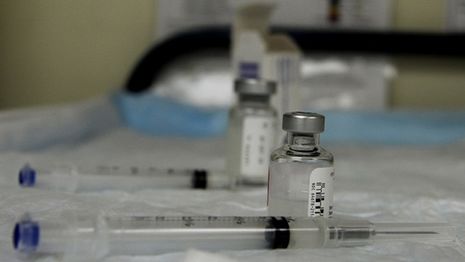Cambridge’s work on coronavirus vaccine moving ‘very quickly’, says academic
As Public Health England and colleges step up their advice, Rebecca Kingsley says the pre-clinical phase of vaccine testing is ‘well under way’

A Cambridge postdoctoral scientist who is part of the University’s efforts to develop a vaccine for the novel coronavirus (COVID-19) has said that work is “already well under way”, but noted that a current lack of funding was hindering faster progress.
Rebecca Kingsley, affiliated to Cambridge’s Infectious Diseases Interdisciplinary Research Centre, is part of Cambridge’s team leading development of a vaccine. She argued that their work is currently focusing on “the design and pre-clinical phase of vaccine testing”.
The news has come as the number of confirmed cases in the UK rose to 16 as of Thursday afternoon, while Italy – Europe’s worst affected country – has seen case numbers rise well above 500. Public Health England (PHE) and Cambridge colleges have also stepped up their advice, recommending self-isolation to all those travelling from Iran, and certain areas in both Northern Italy and South Korea even if not displaying symptoms.
In the US, pharmaceutical company Novavax has also begun testing a vaccine on animal models, while American biotechnology giant Gilead has started human trials for its antiviral drug, Remdesivir.
“Coronaviruses are known to be difficult to develop vaccines against,” Kingsley told Varsity. She said that “previous experimental coronavirus vaccines have caused side effects in pre-clinical studies, making lung disease worse and were abandoned before human clinical trials began.”
However, Kingsley explained that the team is “us[ing] innovative technologies to avoid the problem by selecting specific coronavirus proteins that will be incorporated in the vaccine and will trigger the human immune system to produce the important and focussed antibody responses that we need to protect us against the virus.”
Kingsley added that the researchers, also including Head of University’s Laboratory of Viral Zoonotics Professor Jonathan Heeney, have “a strong working relationship” with PHE. After initial testing in Cambridge, the vaccine will be sent for its final stage of pre-clinical testing at PHE.
But both Kingsley nor Heeney were cautious to give estimates of exact timings for when human trials will begin, as their primary objective was focused first and foremost “on the safety of the vaccine”.
According to Kingsley, the UK government has earmarked £20 million in funding for COVID-19 vaccine research.
However, recipients of the funds have not been announced. Kingsley stressed that only with more funding will the team be able to “continue progressing through the production of the vaccine to the required regulatory standards and then into the first human clinical trial.”
“An increase in funding allows for an increase in resources and this would enable us to speed up the workflow in the lab”, she said.
“We are already moving very quickly and with an increase in manpower we can move even faster.”
Kingsley also emphasised that though “there is no doubt that we need to take this outbreak seriously and public health measures to prevent the spread of the disease are of utmost importance,” there is “no sense in panicking.”
 News / Judge Business School advisor resigns over Epstein and Andrew links18 February 2026
News / Judge Business School advisor resigns over Epstein and Andrew links18 February 2026 News / Gov grants £36m to Cambridge supercomputer17 February 2026
News / Gov grants £36m to Cambridge supercomputer17 February 2026 News / CUCA members attend Reform rally in London20 February 2026
News / CUCA members attend Reform rally in London20 February 2026 News / Union speakers condemn ‘hateful’ Katie Hopkins speech14 February 2026
News / Union speakers condemn ‘hateful’ Katie Hopkins speech14 February 2026 News / Hundreds of Cambridge academics demand vote on fate of vet course20 February 2026
News / Hundreds of Cambridge academics demand vote on fate of vet course20 February 2026











